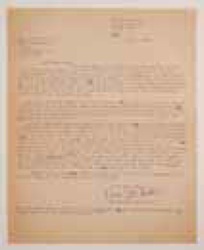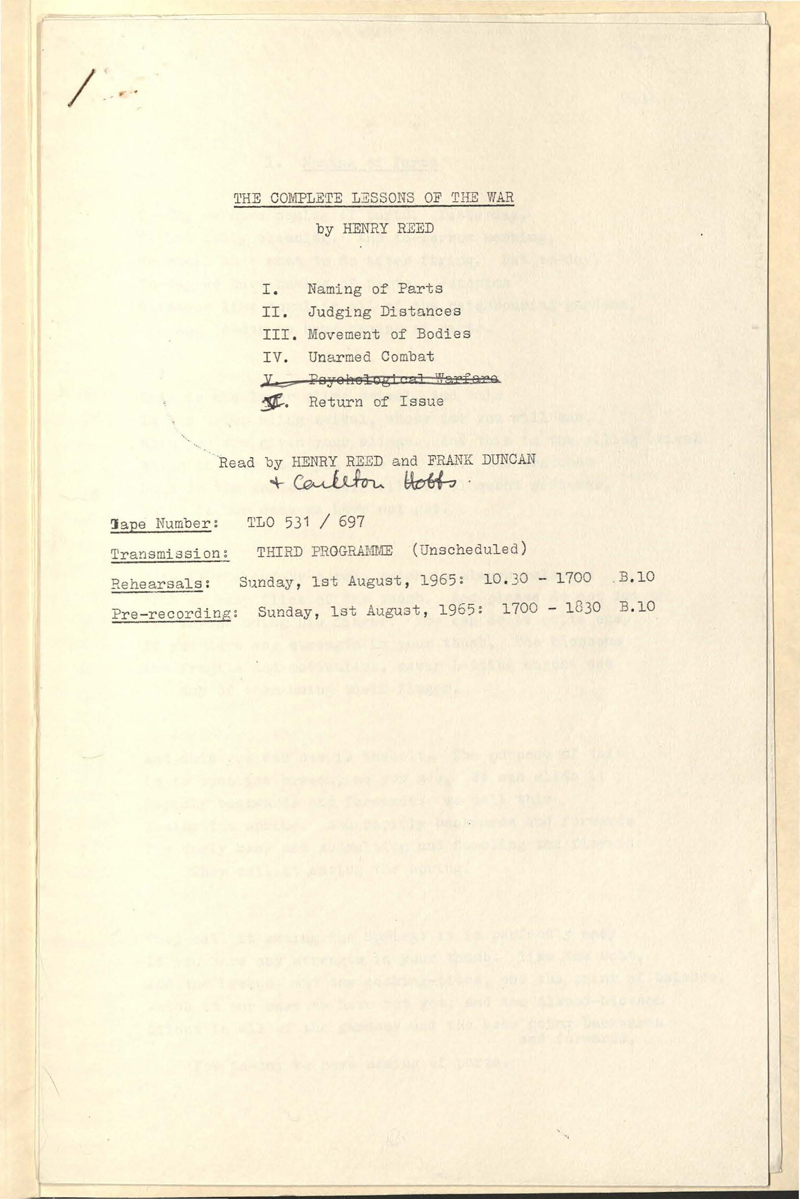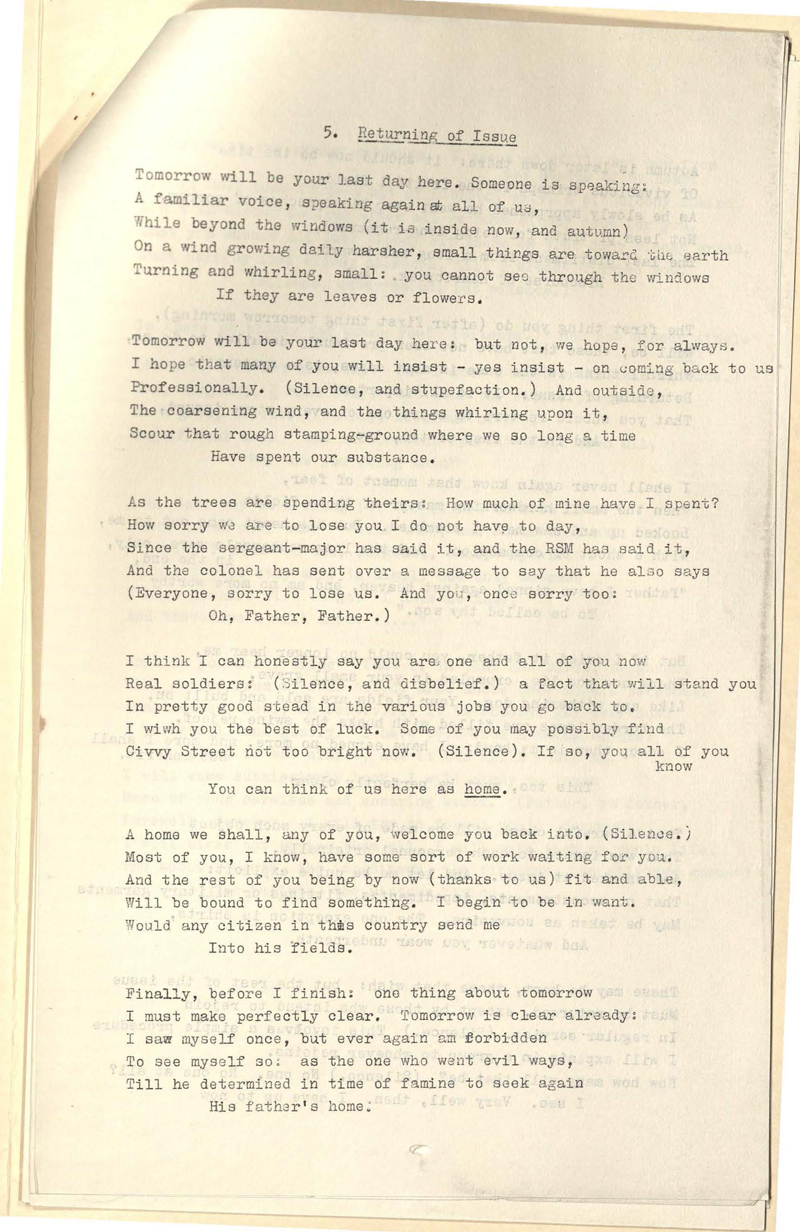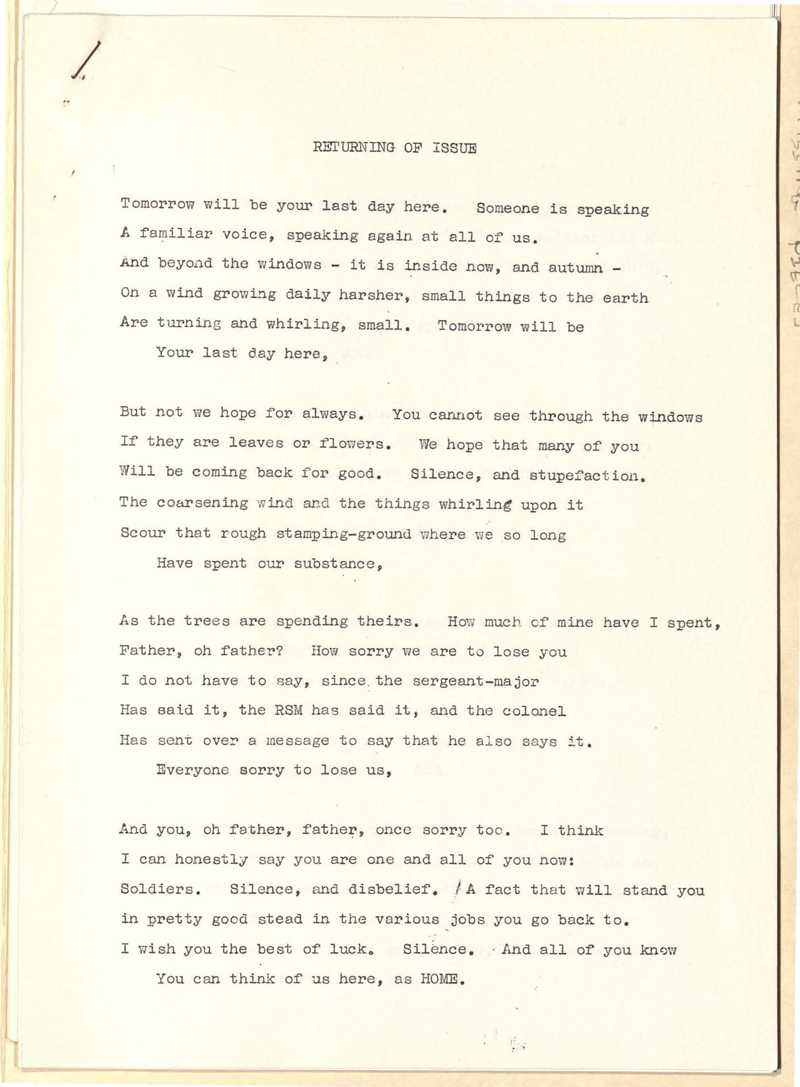|
|
Documenting the quest to track down everything written by
(and written about) the poet, translator, critic, and radio
dramatist, Henry Reed.
An obsessive, armchair attempt to assemble a comprehensive
bibliography, not just for the work of a poet, but for his
entire life.
Read " Naming of Parts."
|
Contact:
|
|
|
|
Reeding:
|
 |
I Capture the Castle: A girl and her family struggle to make ends meet in an old English castle.
|
 |
Dusty Answer: Young, privileged, earnest Judith falls in love with the family next door.
|
 |
The Heat of the Day: In wartime London, a woman finds herself caught between two men.
|
|
|
|
Elsewhere:
|
|
All posts for "ReturningOfIssue"
|
|
|
27.7.2024
|
Here is a unique opportunity to see Henry Reed's editing process, over the span of five years' time. Below are shown two scripts for the BBC broadcasts of Reed's The Complete Lessons of the War, the first from February, 1966, and the second from a later broadcast, in December 1970. The 1970 program was in conjunction with the collection Lessons of the War, published by Reed's producer, Douglas Cleverdon and his press, Clover Hill Editions.
On the front page of the script from 1965, you can see that — in addition to the five Lessons of the War poems read on the air on Radio 3 — the poem "Psychological Warfare" was also scheduled, but ultimately crossed out. Reed was obviously unhappy with it, and it was still unfinished before 1970. "Psychological Warfare" was not published until Reed's Collected Poems appeared in 1991 (edited by Jon Stallworthy), and actually made its debut in March of that year, in the London Review of Books.
The scripts for the other Lessons of the War poems, "Naming of Parts," "Judging Distances," "Unarmed Combat," and "Movement of Bodies," are all the same. But Reed continued to revise "Returning of Issue" — which he always kept last as the coda to the Lessons of the War sequence — until the poems were published in collection. The billing for 1970's Complete Lessons of the War states that "The fifth poem, Returning of Issue, has been largely rewritten since the programme was first broadcast in 1966. This new version has been re-recorded."
Notice the text cut between the two, the dispensable adjectives lost, and the line breaks shifted:
In the 1965 script for broadcast, the first two stanzas are (and in direct contrast to the season of spring from "Naming of Parts" in 1946): Tomorrow will be your last day here. Someone is speaking:
A familiar voice, speaking again at all of us,
While beyond the windows (it is inside now, and autumn)
On a wind growing daily harsher, small things are toward the earth
Turning and whirling, small: you cannot see through the windows
If they are leaves or flowers
Tomorrow will be your last day here: but not, we hope, for always.
I hope that many of you will insist — yes insist — on coming back to us
Professionally. (Silence, and stupefaction.) And outside,
The coarsening wind, and the things whirling upon it,
Scour that rough stamping-ground where we so long a time
Have spent our substance. While in the 1970 script, rewritten and re-recorded for the new broadcast, we find the whole poem much improved, and restructured to conform more with the other early Lessons poems. The revised stanzas are as follows:
Tomorrow will be your last day here. Someone is speaking
A familiar voice, speaking again at all or us.
And beyond the windows — it is inside now, and autumn —
On a wind growing daily harsher, small things to the earth
Are turning and whirling, small. Tomorrow will be
Your last day here,
But not we hope for always. You cannot see through the windows
If they are leaves or flowers. We hope that many or you
Will be coming back for good. Silence, and stupefaction.
The coarsening wind and the things whirling upon it
Scour that rough stamping-ground where we so long
Have spent our substance, You can view scans of the full scripts, here: both from 1965, but one without a revised "Returning of Issue," and the other with several revised copies of the poem, circa 1970.
|
1537. Radio Times, "Full Frontal Pioneer," Radio Times People, 20 April 1972, 5.
A brief article before a new production of Reed's translation of Montherlant, mentioning a possible second collection of poems.
|
Maggs Bros., Ltd., is a London-based rare book and manuscript dealer, in business for over a century and a half. Here, in their inventory, is a listing for catalogue 1446, " Books from the Library of Douglas Cleverdon, 1903-1987." Cleverdon was a small press publisher and BBC radio producer. If you are a font-fanatic, you might be interested to know that Gill Sans, designed by Eric Gill, was originally created for the signboard over Cleverdon's bookshop in Bristol.
Among his credits as a radio producer, Cleverdon was responsible for the adaptation of David Jones's In Parenthesis (1948); Henry Reed's Italia prize-winning drama, Return to Naples (1950); Dylan Thomas's Under Milk Wood (1954); as well as all the plays in Reed's seven-part Hilda Tablet sequence (1953-1959). All in all, Cleverdon produced over two hundred programs for the BBC.
There's a fine article by Alex Hamilton on Cleverdon's achievements, "The Third Man," in The Guardian from November 20, 1971, which accompanied a profile on Henry Reed for the publication of the Hilda plays.
The Maggs Bros. catalogue, which is from 2010, includes this item:
 54 REED (Henry). Returning of Issue. 54 REED (Henry). Returning of Issue.
Original heavily corrected manuscript and heavily corrected typescript of the fifth and final poem in Henry Reedís The Complete Lessons of the War series, inscribed by Reed: "To Douglas & Nest Cleverdon with love and gratitude Henry Reed, July 29, 1965". With a note from Henry Reed confirming Cleverdonís ownership of the manuscript and a note from the BBC allowing this gift from Reed to Cleverdon. £4000
Together with 23 TLS and ALS from Reed, predominantly to Douglas but with a couple to Nest and one to their elder son Lewis. Mostly in the mid 1960s and about radio drama and poetry by Henry Reed and the BBC but with 7 from 1950-51, also about Reedís radio work. One is in the character of the spinster "Emma Titt-Robbins", Tablet was the protagonist of Reedís satire The Private Life of Hilda Tablet, broadcast in 1954.
The catalogue also includes Cleverdon's personal, inscribed copy of Reed's poems, A Map of Verona.
I don't know if anyone snapped up the Reed manuscripts and letters back in 2010, but if I had £4000 pocket change, I would donate them to the University of Birmingham's Special Collections, to go with rest of Reed's papers and manuscripts.
|
1536. L.E. Sissman, "Late Empire." Halcyon 1, no. 2 (Spring 1948), 54.
Sissman reviews William Jay Smith, Karl Shapiro, Richard Eberhart, Thomas Merton, Henry Reed, and Stephen Spender.
|
Recently published by Cambridge University Press is Kate McLoughlin's Authoring War: The Literary Representation of War from the Iliad to Iraq. McLoughlin is a Lecturer in English Literature at Birkbeck College, University of London, and has previously edited The Cambridge Companion to War Writing (2009). From the publisher's description:
Kate McLoughlin's Authoring War is an ambitious and pioneering study of war writing across all literary genres from earliest times to the present day. Examining a range of cultures, she brings wide reading and close rhetorical analysis to illuminate how writers have met the challenge of representing violence, chaos and loss. War gives rise to problems of epistemology, scale, space, time, language and logic. She emphasizes the importance of form to an understanding of war literature and establishes connections across periods and cultures from Homer to the 'War on Terror'.
You can also find a substantial preview of Authoring War on Google Books. McLoughlin devotes three pages to Reed's Lessons of the War sequence, from "Naming of Parts" ('begins the process of transforming non-combatant experience through the replacement of civilian by military language and semantics'), through " Returning of Issue":
The final part of 'Lessons of the War' is 'Returning of Issue', which takes the form of a discharge talk by the sergeant. The men are standing inside now because it is autumn, and through the window the recruit-speaker notes a coming down to earth of 'small things' turning and whirling in the wind. He is unable to tell whether these small things are 'leaves or flowers': it is as though his perception has been thoroughly miltarised, so that he is no longer capable of appreciating the realm of almond-blossom, japonica — and love. Indeed, the sergeant remarks, 'I think / I can honestly say you are one and all of you now: / Soldiers'. In this section, as in the others, Reed exploits the military and civilian meanings of a phrase: here, 'Returning of Issue' denotes not only the giving back of kit after service but the prodigal son's return to his father. The recruit-speaker is unable to return to his father — significantly, his parent's fields are 'sold and built on' — and so elects to stay in the army. The actual terrain on which his peacetime identity was grounded has been irretrievably lost, and so he decides to remain, not a person, but 'a personnel'. In turn, he will himself 'teach: / A rhetoric instead of words; instead of love, the use / Of accoutrements'. His consciousness has forever changed — 'I have no longer gift or want' — and so his place must change too. (p. 105) is due to be released in the States on March 31, and is available for pre-order on Amazon.com.
|
1535. Reed, Henry. "Talks to India," Men and Books. Time & Tide 25, no. 3 (15 January 1944): 54-55.
Reed's review of Talking to India, edited by George Orwell (London: Allen & Unwin, 1943).
|
|
|
|
1st lesson:
Reed, Henry
(1914-1986). Born: Birmingham, England, 22 February 1914; died: London, 8
December 1986.
Education: MA, University of Birmingham, 1936. Served: RAOC, 1941-42; Foreign Office, Bletchley Park, 1942-1945.
Freelance writer: BBC Features Department, 1945-1980.
Author of:
A Map of Verona: Poems (1946)
The Novel Since 1939 (1946)
Moby Dick: A Play for Radio from Herman Melville's Novel (1947)
Lessons of the War (1970)
Hilda Tablet and Others: Four Pieces for Radio (1971)
The Streets of Pompeii and Other Plays for Radio (1971)
Collected Poems (1991, 2007)
The Auction Sale (2006)
|
Search:
|
|
|
Recent tags:
|
Posts of note:
|
Archives:
|
Marginalia:
|
|











